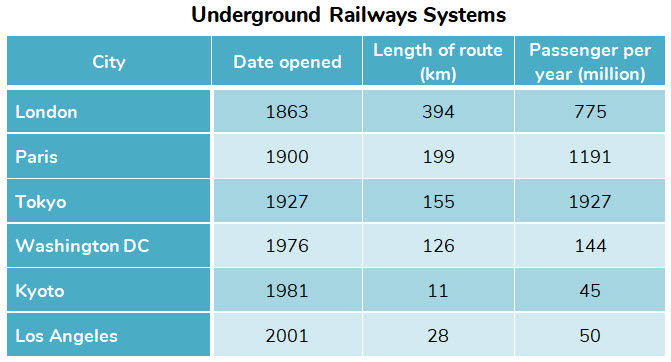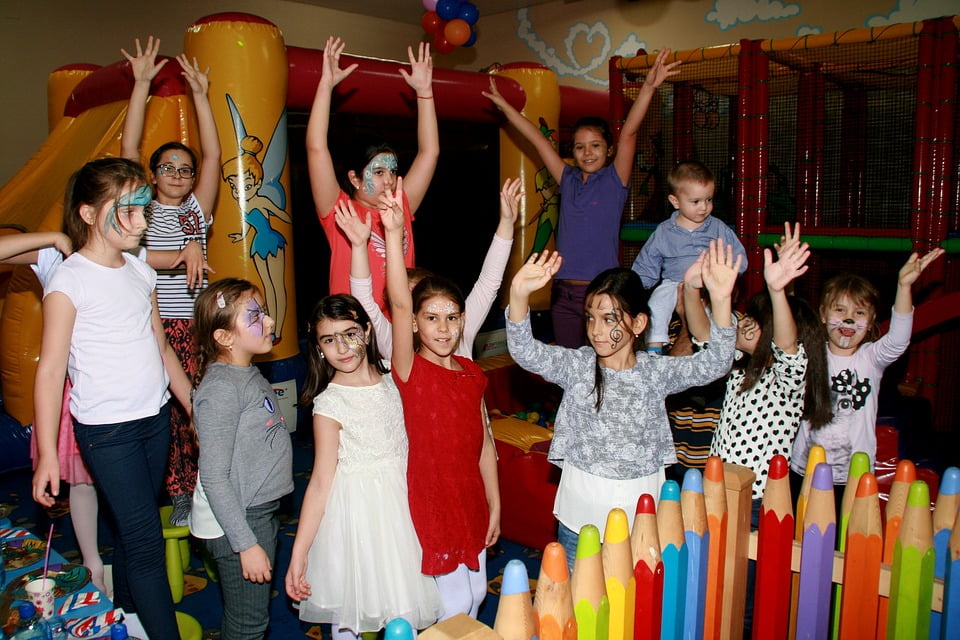[Md Faiyaz B] Writing Practice Test 555894
Task 1
You should spend about 20 minutes on this task.
The table below gives information about the underground railway systems in six cities.
Summarise the information by selecting and reporting the main features, and make comparisons where relevant.
You should write at least 150 words.

The table provided illustrates information about underground railway systems of six major cities around the world. It shows us the opening date, length of route and passenger per year for each of the cities.
Overall, the data is in order of the establisment date of the railway system in each cities. London is the oldest and Los Angeles is the newest to introduce this system. Also, London has the biggest railway system, where Kyoto has the smallest. Tokyo experiences the highest number of passengers each year, and Kyoto has the fewest among the these six systems.
The London underground railway system opened in 1863 and has the length of 394km. Paris, Tokyo, Washington DC and Kyoto built their systems in 20th century, and have 199km, 155km, 126km and 11km of railway respectively. The newest edition, which is Los Angeles, was built in 2001 with 28km of lines.
The biggest system by passenger traffic is Tokyo, which faces 1927 million passengers per year. Paris and London also see significant number of passangers, and the numbers are 1191 million and 775 million. Other stations such as Washington DC, Kyoto and Los Angeles relatively small traffic and only face 144million, 45million and 50million passengers each year.
Task 2
You should spend about 40 minutes on this task.
Write about the following topic:
Some people think that a sense of competition in children should be encouraged. Others believe that children who are taught to co-operate rather than compete become more useful adults.
Discuss both these views and give your own opinion.
Give reasons for your answer and include any relevant examples from your own knowledge or experience.
You should write at least 250 words.

A common perception among some people is that competing with other children should be encouraged. Other people oppose this idea and say that teaching co-operation is the better option to make them more useful. While both the point of view have some merits, I believe co-operation with others is the better method to make them better grownups. Co-operation with peers teaches interection and teamwork, grows empathy towards others, and makes them more social.
A way of parenting puts light on the competition with other children. People often encourage kids to compete with others while learning something. They believe the sense of competition motivates the child to learn faster. To be better than other kids, children need to give their best at anything they do. Seeing someone's achievement, you get automatic motivation to work harder due to your competitiveness. This frequent urge to be better than your peers pushes every kid to aim higher, and each of them becomes the motivation to another. This kind of healthy competition can accelerate a kid's development.
Another method is being co-operative. This method preaches the children should connect and co-operate with each other in any common learning places. Everyone will learn collectively, and the sense of competition is absent here. For example, children maybe given a task or puzzle that require teamwork to complete. Completing this task will not only teach teamwork but also teach them to lead or play a specific role. This co-operative environment enables the social interection among kids as well as grows empathy. Generally, these children tend to have a wider acceptance range than others.
In conclusion, I prefer co-operative environment because we live in a society that requires social interactions and teamwork. Competitiveness can be a good trait but co-operation will push someone to be more of a team player. So, it is evident that a co-operative child has higher chances of being useful to the society than a competitive minded child.
Community’s feedback
Sorry! We couldn't find any contents.



